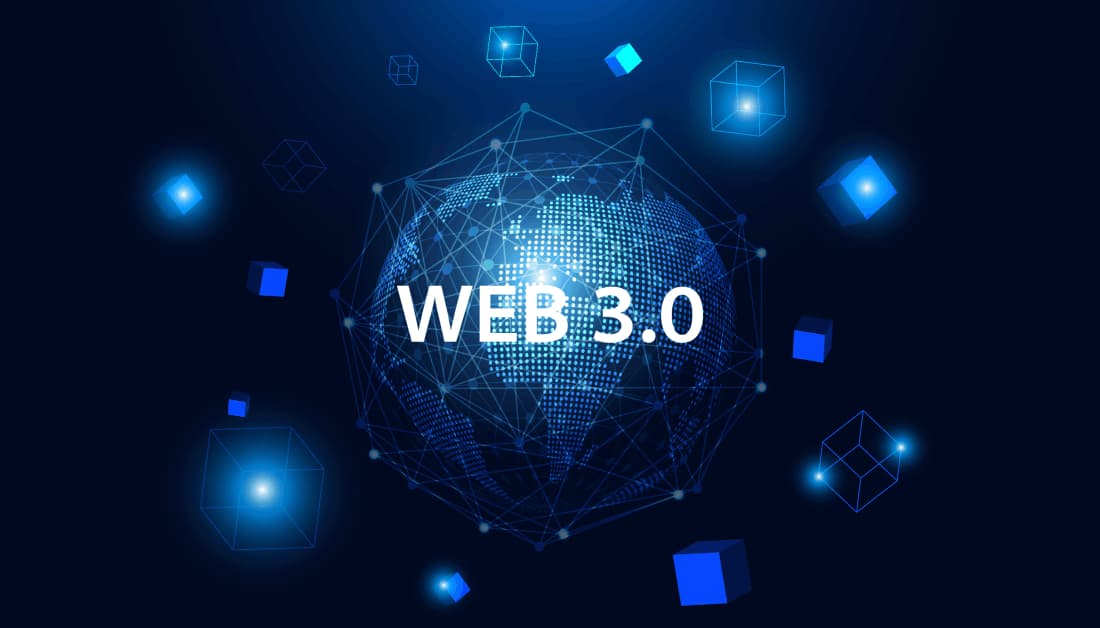
Many projects in the crypto and blockchain space are exploring Web3 domains due to the limitations of Web2 domains, which don't give full ownership to their users. Web3 domains are gaining global attention for offering a more secure and decentralized online environment.
Using blockchain technology, Web3 domains have several advantages over traditional Web2 domains. More and more people and businesses are getting on board with Web3 domains because of their practical uses and the significant impact they're expected to make on the future of the Internet.
This educational article will discuss what Web3 domains are and why they are shaping the future of the Internet. What are Web3 domains?
Web3, or blockchain domains, are domain names registered on a blockchain instead of the traditional centralized domain registrars. These domains utilize decentralized and secure digital ledger blockchain technology to manage domain ownership and associated data. The blockchain ensures that domain ownership and records are unchangeable, transparent, and censorship-resistant.
The problem that Web3 domains aim to solve is that Web2 domains are essentially leased from organizations like ICANN, involving recurring fees, making them not truly owned by the users. In contrast, Web3 domains are completely owned and documented on an unalterable blockchain, removing central control. No ongoing fees exist; you pay once, and the domain is yours indefinitely. Importantly, Web3 allows ownership of second and even top-level domains (TLDs).
Web3 domains are typically built on blockchain platforms that support creating decentralized applications (dApps), smart contracts, and digital assets. Ethereum is a prominent example of a platform that accommodates various Web3 domain providers.
Key features of Web3 domains explained:
- Ownership and Control: Web3 domains grant you complete ownership and control over your domain names, eliminating the need for reliance on intermediaries or centralized authorities. This ensures greater security, reducing the risk of domain hijacking or website censorship.
- Decentralization: Unlike traditional domain systems that depend on centralized authorities for management, Web3 domains operate on decentralized networks. This decentralized approach enhances security, reliability, and resistance against manipulation or control by any single entity.
- Interoperability: Web3 domains are specifically crafted to integrate with a variety of blockchain applications seamlessly. Without complications, this allows effortless linking of your domain name to digital assets, wallets, and decentralized applications (dApps).
- Privacy and Security: The decentralized nature of Web3 domains enhances privacy and security measures. You can manage your personal information and data without the involvement of third-party entities, significantly reducing the risk of data breaches or cyberattacks.
Web3 domain providers within the crypto space
Web3 domains mark a transformative change in the online world, offering improved ownership, privacy, security, and immunity against censorship. As awareness of Web3 domains and blockchain technology grows, the Internet is poised to become a more decentralized, user-centric, and inclusive environment. This shift opens the door to abundant possibilities for innovation and expansion. Pioneering providers like Unstoppable Domains, ENS, and Handshake are at the forefront of this evolution.
- Unstoppable Domains
Unstoppable Domains operates as a Web3 domain service on the Ethereum blockchain, utilizing the InterPlanetary File System (IPFS). This platform enables users to generate domain names that are resistant to censorship and unchangeable. These unique domains function as easily readable addresses and have the capacity to store decentralized websites and content. Unstoppable Domains allow for domain ownership and control decentralization, giving users full control over their domains without any centralized authority. It also facilitates seamless integration with various cryptocurrency wallets, enabling users to associate their domains with cryptocurrency addresses.
Image Source: Unstoppable Domains Website
- ENS (Ethereum Name Service)
ENS, or Ethereum Name Service, functions on the Ethereum blockchain, enabling users to substitute intricate Ethereum addresses with easy-to-read domain names. This capability greatly improves the user experience and accessibility within the Ethereum ecosystem, simplifying transactions for users. ENS harnesses the decentralized nature of blockchain technology, guaranteeing secure and transparent domain ownership and resolution processes, free from central authority control. Its compatibility with a range of Ethereum applications and services enhances its practicality and encourages widespread use.
Image Source: ENS Website
- Handshake (HNS)
Handshake is a decentralized naming protocol established on its own blockchain, aiming to transform the conventional domain name system (DNS) into a more secure, decentralized model. Unlike traditional DNS, Handshake enables users to register and oversee domain names without relying on central authorities, ensuring resistance against censorship and bolstering security. Users have the unique opportunity to craft and possess top-level domains (TLDs), democratizing the domain landscape. Handshake encourages network decentralization by incentivizing users to run full nodes and actively engage in its operation. Through the distribution of HNS coins as rewards, Handshake promotes a more widespread and resilient DNS infrastructure.

Image Source: Handshake Twitter Account
Conclusion
Web3 domains empower individuals by transferring control from centralized authorities to users, echoing the internet's values of freedom, privacy, and equal opportunity. Their blockchain foundation makes them highly resistant to censorship, guaranteeing unchanged accessibility despite external pressures. These domains foster inclusivity by connecting people globally, even in areas with limited internet access. Additionally, integrating blockchain and Web3 domains opens doors to new economic possibilities, including decentralized applications, asset tokenization, and innovative business approaches.



